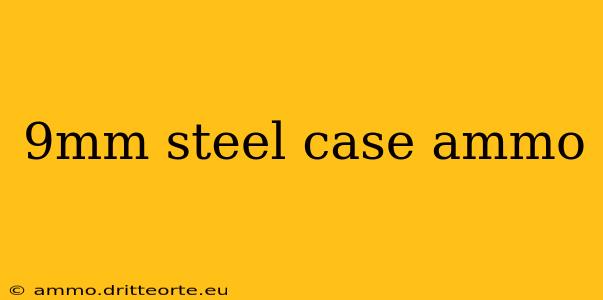Finding the right ammunition can be a challenge, especially with the wide variety of options available. This guide delves into the specifics of 9mm steel case ammo, exploring its advantages, disadvantages, and considerations for different shooting applications. Whether you're a seasoned firearms enthusiast or a newcomer to the shooting world, understanding the nuances of steel-cased ammunition is crucial for making informed purchasing decisions.
What is 9mm Steel Case Ammo?
9mm steel case ammo, as the name suggests, utilizes steel instead of brass for its cartridge casing. This seemingly small difference impacts several aspects of the round, from its cost and performance to its compatibility with different firearms. Steel casings are significantly cheaper to produce than brass, making steel-cased 9mm a budget-friendly option for high-volume shooting.
Advantages of 9mm Steel Case Ammo:
-
Cost-Effectiveness: This is arguably the most significant advantage. Steel casings are less expensive to manufacture, resulting in lower prices for consumers. This is particularly beneficial for those who engage in frequent practice or participate in high-round-count shooting activities like competition shooting or self-defense training.
-
Availability: Due to its affordability, 9mm steel case ammo is generally more readily available than its brass-cased counterpart, especially during periods of high demand. This consistent availability is a key factor for many shooters.
-
Performance: While some believe steel-cased ammo is inferior in terms of performance, modern manufacturing techniques have largely mitigated these concerns. Many reputable manufacturers produce steel-cased 9mm that provides reliable accuracy and consistent velocities.
Disadvantages of 9mm Steel Case Ammo:
-
Potential for Corrosion: Steel is more susceptible to rust and corrosion than brass, especially in humid or wet conditions. Proper storage is crucial to prevent deterioration.
-
Compatibility Issues: Some firearms, particularly those with tighter tolerances or sensitive extractors, may experience malfunctions with steel-cased ammo. It's essential to consult your firearm's manual to confirm compatibility.
-
Recoil: While negligible for most shooters, some might experience a slightly sharper recoil due to the slightly heavier weight of steel compared to brass.
Choosing the Right 9mm Steel Case Ammo
Selecting the best 9mm steel case ammo depends on your individual needs and shooting preferences. Consider the following factors:
-
Manufacturer Reputation: Opt for reputable manufacturers with a proven track record of producing reliable ammunition.
-
Intended Use: Are you using it for target practice, self-defense, or competition? The requirements for each application may vary.
-
Grain Weight: Bullet grain weight affects ballistic performance, influencing accuracy, range, and penetration.
-
Type of Bullet: Different bullet types (FMJ, HP, etc.) offer varied terminal ballistics and are suited for different applications. Always check local regulations concerning bullet type legality.
Proper Storage and Handling of 9mm Steel Case Ammo
Storing 9mm steel case ammo correctly is critical to maintain its integrity and prevent corrosion. Here are some key recommendations:
-
Dry Environment: Store in a dry, cool place away from excessive moisture.
-
Airtight Containers: Use airtight containers or ammunition cans to protect against humidity.
-
Regular Inspection: Periodically inspect your ammo for any signs of rust or damage.
Conclusion
9mm steel case ammo presents a cost-effective and readily available option for many shooters. However, it's crucial to be aware of its potential disadvantages and to choose the right ammo for your firearm and intended use. By understanding the characteristics of steel-cased ammunition and following proper storage procedures, you can confidently utilize this affordable option while maintaining firearm reliability and safety. Remember always to consult your firearm's manual and local regulations before using any ammunition.

